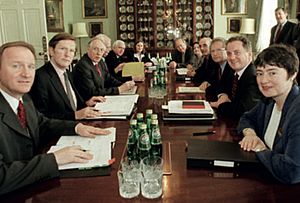Donald Dewar facts for kids
Quick facts for kids
Donald Dewar
|
|||||||||||||||||||||||||||||||||||
|---|---|---|---|---|---|---|---|---|---|---|---|---|---|---|---|---|---|---|---|---|---|---|---|---|---|---|---|---|---|---|---|---|---|---|---|
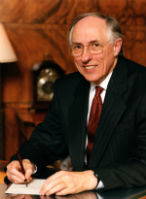
Official portrait, 1999
|
|||||||||||||||||||||||||||||||||||
| First Minister of Scotland | |||||||||||||||||||||||||||||||||||
| In office 13 May 1999 – 11 October 2000 |
|||||||||||||||||||||||||||||||||||
| Monarch | Elizabeth II | ||||||||||||||||||||||||||||||||||
| Deputy | Jim Wallace | ||||||||||||||||||||||||||||||||||
| Preceded by | Office established | ||||||||||||||||||||||||||||||||||
| Succeeded by | Jim Wallace (acting) Henry McLeish |
||||||||||||||||||||||||||||||||||
| Leader of Labour Party in Scotland | |||||||||||||||||||||||||||||||||||
| In office 7 May 1999 – 11 October 2000 |
|||||||||||||||||||||||||||||||||||
| UK party leader | Tony Blair | ||||||||||||||||||||||||||||||||||
| Preceded by | Position established | ||||||||||||||||||||||||||||||||||
| Succeeded by | Henry McLeish | ||||||||||||||||||||||||||||||||||
| Secretary of State for Scotland | |||||||||||||||||||||||||||||||||||
| In office 2 May 1997 – 17 May 1999 |
|||||||||||||||||||||||||||||||||||
| Prime Minister | Tony Blair | ||||||||||||||||||||||||||||||||||
| Preceded by | Michael Forsyth | ||||||||||||||||||||||||||||||||||
| Succeeded by | John Reid | ||||||||||||||||||||||||||||||||||
|
|||||||||||||||||||||||||||||||||||
|
|||||||||||||||||||||||||||||||||||
| Personal details | |||||||||||||||||||||||||||||||||||
| Born |
Donald Campbell Dewar
21 August 1937 Glasgow, Scotland |
||||||||||||||||||||||||||||||||||
| Died | 11 October 2000 (aged 63) Edinburgh, Scotland |
||||||||||||||||||||||||||||||||||
| Cause of death | Cerebral hemorrhage | ||||||||||||||||||||||||||||||||||
| Political party | Scottish Labour | ||||||||||||||||||||||||||||||||||
| Spouse |
Alison McNair
(m. 1964; div. 1973) |
||||||||||||||||||||||||||||||||||
| Children | 2 | ||||||||||||||||||||||||||||||||||
| Education | University of Glasgow | ||||||||||||||||||||||||||||||||||
Donald Campbell Dewar (born 21 August 1937 – died 11 October 2000) was an important Scottish politician. He was the very first First Minister of Scotland and the leader of the Labour Party in Scotland from 1999 until his death in 2000. Before this, he was the Secretary of State for Scotland from 1997 to 1999.
Donald Dewar was a Member of Parliament (MP) for Glasgow Anniesland (and before that, Glasgow Garscadden) from 1978 to 2000. He was also a Member of the Scottish Parliament (MSP) for Glasgow Anniesland from 1999 to 2000.
Born in Glasgow, Dewar studied history and law at the University of Glasgow. He worked as a lawyer before becoming a politician. At 28, he was elected to the British Parliament. After losing his seat in 1970, he went back to law and even hosted a radio show.
He was re-elected to Parliament in 1978. When the Labour Party won a big election in 1997, Prime Minister Tony Blair made him the Secretary of State for Scotland. In this role, he strongly supported creating a new Scottish Parliament. He worked hard on the Scotland Act 1998, which brought the Scottish Parliament back after nearly 300 years.
Dewar led the Labour Party in the first Scottish Parliament election in 1999. He became an MSP for Glasgow Anniesland. On 7 May 1999, he became the leader of the Labour Party in Scotland. He then worked with the Scottish Liberal Democrats to form a government. Donald Dewar was elected as the first First Minister of Scotland on 13 May 1999. He led the first Scottish Government cabinet. He planned new laws for education, land reform, and creating National Parks in Scotland.
Donald Dewar passed away on 11 October 2000, at 63 years old, due to a brain hemorrhage. He was still serving as First Minister. Jim Wallace became acting First Minister, and then Henry McLeish took over. Donald Dewar is often called the "Father of the Nation" because of his important work in bringing back the Scottish Parliament.
Contents
Donald Dewar's Early Life
Growing Up in Glasgow
Donald Campbell Dewar was born on 21 August 1937 in Glasgow, Scotland. He grew up as an only child in a middle-class family in Kelvingrove. His father, Dr. Alasdair Dewar, was a skin doctor. His mother was Mary Howat Dewar.
Both of Donald's parents had health problems when he was young. His father had tuberculosis, and his mother had a brain tumour. Donald went to a small school in the Scottish Borders during World War II. From age nine, he attended Mosspark Primary School and then The Glasgow Academy. He later said he was a "shy and awkward" child.
His University Days
In 1957, Dewar started studying at the University of Glasgow. His parents, two uncles, and an aunt had also gone there. At university, he met many people who would also become important politicians. These included John Smith, who later led the Labour Party, and Sir Menzies Campbell, who led the Liberal Democrats.
Dewar was involved in student life. He was an editor for the Glasgow University Guardian newspaper. He also led the University Labour Club and was president of the Glasgow University Union. In 1961, he earned a degree in History, and in 1964, a degree in Law. After finishing university, he worked as a lawyer in Glasgow.
Starting His Political Journey
Becoming a Member of Parliament
Donald Dewar was a member of the Labour Party. He wanted to become a MP and represent people in the UK Parliament. In 1962, he tried to win the Aberdeen South seat but didn't succeed. However, in the 1966 election, at just 28 years old, he won the seat. He beat Priscilla Tweedsmuir by 1,799 votes.
In his first speech in the House of Commons on 4 May 1966, Dewar spoke against a new tax on potatoes. His speech was a success, and the tax was removed the next year. In 1967, Dewar became a Parliamentary Private Secretary to the Education Secretary, Anthony Crosland. He stayed in this role until 1969. In 1970, he lost his seat in the election to Iain Sproat.
Life Outside Parliament
After losing his seat, Dewar spent much of the 1970s trying to get back into Parliament. He hosted a Friday evening talk show on Radio Clyde. He also worked as a lawyer and became a partner in a law firm in 1975.
Returning to Westminster
Donald Dewar was chosen to run for the Glasgow Garscadden seat after the local MP passed away. He won the by-election on 13 April 1978. This was an important win, as it helped stop the growth of the Scottish National Party. In 1979, he supported a "Yes" vote in Scotland's first vote on devolution, which was about giving Scotland more power. Even though the "Yes" side won, it wasn't enough to meet the rules, and the government later fell.
Working in Opposition
Dewar became the chairman of the Scottish Affairs Select Committee. This gave him a platform to ask tough questions. In November 1980, he joined the Labour Party's main team as a Scottish affairs spokesperson. He quickly moved up, becoming the Shadow Scottish Secretary in November 1983. On 21 December 1988, Dewar was in Lockerbie after the bombing of Pan Am Flight 103, as he was the Shadow Cabinet member responsible for Scottish issues. In 1992, John Smith made him the Shadow Social Security Secretary. Three years later, Tony Blair made Dewar the Chief Whip for the Labour Party.
Secretary of State for Scotland (1997–1999)
In the 1997 general election, Donald Dewar became the MP for Glasgow Anniesland. The Labour Party won this election by a huge amount, and Dewar was given the important job of Secretary of State for Scotland. In this role, he was able to start the process of bringing back a Scottish Parliament, something he had wanted for many years. He worked hard to create the Scotland Act 1998, which led to Scotland having its own Parliament again after almost 300 years.
The 1999 Scottish Parliament Election
In January 1998, Dewar confirmed he would run for a seat in the new Scottish Parliament. The first elections for the Scottish Parliament were held on 6 May 1999. Dewar led the Scottish Labour Party against the Scottish National Party, led by Alex Salmond. Dewar was elected as a Member of the Scottish Parliament (MSP) for Glasgow Anniesland. This meant he was both an MP and an MSP for the same area, which was quite unusual.
First Minister of Scotland
On 13 May 1999, Donald Dewar was chosen by the Scottish Parliament to be the nominee for First Minister of Scotland. He received 71 votes from MSPs. On 17 May, Queen Elizabeth II officially appointed him at Holyroodhouse, and he was sworn in at the Court of Session.
Forming the Government
Even though Scottish Labour won the most seats, they didn't have enough to form a government by themselves. So, they made a deal with the Scottish Liberal Democrats to form a coalition government. Dewar agreed to their request to remove upfront tuition fees for university students.
On 13 May 1999, Dewar was nominated as First Minister. He was officially appointed by the Queen on 17 May at a ceremony in the Palace of Holyroodhouse. He then went to the Court of Session to be sworn in and receive the Great Seal of Scotland.
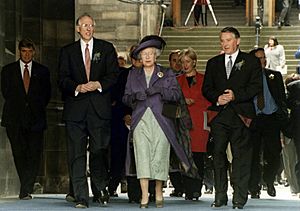
New Laws and Plans
On 16 June, Dewar announced the new government's plans for laws. These included:
- An Education bill to make Scottish schools better.
- Land reform to give people the right to access the countryside.
- A bill to get rid of the old feudal system of land ownership.
- A bill to create National Parks in Scotland.
Death and Funeral
In early 2000, Donald Dewar went to the hospital for heart tests. In May 2000, doctors found he had a faulty heart valve. He had a four-hour operation to fix it. His spokesperson said he was recovering very quickly, and the operation was a success.
Dewar had to take a three-month break from work to recover. Deputy First Minister Jim Wallace took over as acting First Minister during this time. When Dewar returned to work, people noticed he looked tired.
On 10 October 2000, Dewar had a fall outside his home at Bute House after a meeting. He seemed okay at first. But later that day, he suffered a serious brain hemorrhage. This might have been caused by the medicine he was taking after his heart surgery. He was taken to the Western General Hospital in Edinburgh. His condition got worse, and he did not wake up. Donald Dewar was officially pronounced dead on 11 October at 12:18pm. He was 63 years old.
His Funeral Service
Donald Dewar's funeral service was held at Glasgow Cathedral. He was cremated on 18 October 2000, and his ashes were spread at Lochgilphead in Argyll.
Important Guests at the Funeral
Many important people attended his funeral, including:
- The Prince of Wales (now King Charles III)
- Tony Blair, who was the Prime Minister of the United Kingdom
- Jim Wallace, who was the acting First Minister of Scotland
- Bertie Ahern, the Prime Minister of Ireland
- David Trimble, the First Minister of Northern Ireland
- Members of the Scottish Government and the UK Government
- Leaders of other political parties, like John Swinney and Charles Kennedy
Reactions to His Death
Donald Dewar's death was a big shock for Scotland. The UK Foreign Secretary said it was "a tragedy for Donald and a tragedy for Scotland." Henry McLeish, who would become the next First Minister, said: "Donald was devolution. The architect of the most successful constitutional change this century."
Henry McLeish later took over from Donald Dewar as First Minister of Scotland.
Donald Dewar's Legacy
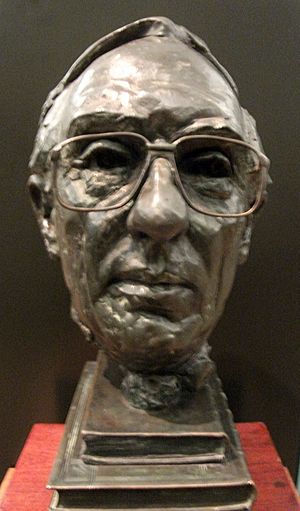
Donald Dewar's strong belief in bringing back the Scottish Parliament and his hard work on writing the Scotland Act 1998 led to him being called the "Father of the Nation" and the "Father of devolution." He started supporting Scottish devolution in the 1960s, even when many politicians didn't agree. He worked hard to get support from all political parties.
Even though Dewar did not support Scottish independence, he believed in the United Kingdom. He saw the new Parliament as a "journey, not a destination." He introduced a system called proportional representation for the Scottish Parliament. Many thought this would stop the Scottish National Party from becoming popular, but over the years, the SNP's popularity grew.
Donald Dewar had some nicknames, like "Donald Dour" because he was often serious and direct. He was also called "The Gannet" because he had a big appetite, which people also linked to his approach to politics.
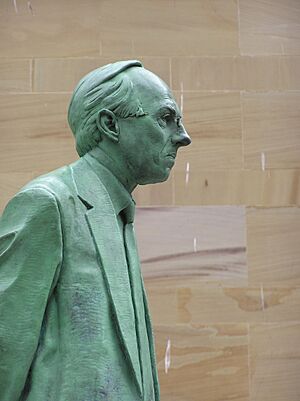
In May 2002, then-Prime Minister Tony Blair unveiled a statue of Dewar at the top of Glasgow's Buchanan Street. The statue shows Dewar wearing a slightly crumpled jacket, which was typical of his appearance.
The statue was moved in 2005 to be cleaned and was put back on a higher base to protect it. On the base of the statue are the famous words from the Scotland Act: "There Shall Be A Scottish Parliament." Dewar himself famously said, "I like that!" about this phrase.
Dewar did not want the new Scottish Parliament to be built at the Old Royal High School on Calton Hill in Edinburgh. This was because it had been the planned site for the Scottish Assembly in the 1979 vote. His opposition helped lead to the choice of the Holyrood site, which turned out to be quite expensive.
A train, the First ScotRail Class 334 334001, was named Donald Dewar in his memory. The "Dewar Arts Award" was also created by the Scottish Government in 2002. This award helps talented young Scottish artists.
Donald Dewar's Personal Life
On 20 July 1964, Donald Dewar married Alison Mary McNair. They had two children, a daughter named Marion and a son named Ian. In 1972, Alison separated from Dewar. They divorced in 1973, and he never remarried.
Dewar had a personal fortune of over £2,000,000. This included shares in public companies, antiques, and artwork.
See also
 In Spanish: Donald Dewar para niños
In Spanish: Donald Dewar para niños
 | Jewel Prestage |
 | Ella Baker |
 | Fannie Lou Hamer |


